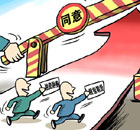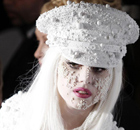Op-Ed Contributors
What does money have to do with true love?
By He Bolin (China Daily)
Updated: 2010-02-11 07:55
 |
Large Medium Small |
Spring Festival seems to be losing its importance among some youths. Those who try to look for changes in their attitude this year, though, may not find any because the first day of the lunar new year (Feb 14) falls on Valentine's Day.
Everything is changing, the times, youths' views on love and marriage, tradition and culture, and family and society, and festivals especially when economic pressure makes it difficult for them to get married and start a family. A survey shows monetary pressure is compelling Chinese people to take a U-turn on their decision to get married or their views on starting a family.
| ||||
Some experts say it is society's responsibility to nurture the correct perception of love and marriage among its youths. But then society itself is changing, and with it the values.
Take skyrocketing housing prices and the opinions of Yu Mingyang, a young English teacher from Guiyang, capital of Guizhou province, as examples. Yu says one has to face all the difficulties life offers, whether it is higher costs of buying a house or the high cost of running one. Housing may not be an impediment to marriage in other countries, but it is in China. According to traditional belief, marriage means a stable life, and for stability you need to own a house, and a house provides escape from uncertainty.
The other problem is closely related to the widening wealth gap. It has become a fad, at least with some people, to show off their money, house and cars. People in their late 30s and 40s do it to assert their status, the youths to impress the opposite sex. Very few youths in cities can evade this cruel reality.
Yu says she hates the trend of girls comparing their boyfriends' wealth, especially those flaunting their cars and money. "It's not that women have become more material. Actually, society itself has changed with advanced production and raised consumption levels. Given today's material richness, can a man still propose to a woman, saying all he has as assets for the family they may start is a bicycle, a watch or a suitcase of clothes?"
A house is just a symbol of the pressure a person is undergoing in today's fast-changing society. A house is the magic wand that could turn the love between a man and woman to the institution of marriage, Yu says. But love or romance may have nothing to do with things in real life, even though marriage does.
In general, women's sense of happiness comes from comparisons. These comparisons can be about anything: as mundane as clothes and shoes, as essential as food, as expensive as diamonds or as emotional as wedding photographs. Women discuss these subjects not because they're material, but because they are measurable.
Non-material things such as true love and mutual respect are perhaps more important for a happy and successful marriage. But the younger generation, given the rising importance of material satisfaction, seems to have less use for it. Besides, it is not possible to start a family in these material times on the foundation of non-material happiness.
But the young cannot be blamed for their attitude toward marriage. People who got married between the late 1970s and the early 1990s had their own source of material happiness: TV sets, refrigerators and washing machines. And they used to do great lengths to get them. Today's youths are doing the same - only that the products have become more advanced and expensive.
Still some yardsticks - like cars and houses - to judge whether a man is worth marrying are still too high for youths who come from not-so-rich families. But then not all seek to get married on the basis of money. One such person is Liu Yanxi, another Guiyang resident. She values love and emotions much more than material gains.
"Marriage is the fruit of love and mutual trust, not a lever to exchange wealth in the name of love," she says. Liu married the love of her life four years ago. Today, she is the mother of a one-year-old boy. Initially many of her family members tried to stop her from getting married because her husband was poor. But money has always been secondary for Liu; she would rather die for love and honesty, and dedicate her life to hard work.
She says people nowadays spend huge amounts on extravagant feasts and for buying expensive houses and cars. But it's not hard to understand why this "money-is-everything" fad has caught up so fast with "face-saving" Chinese. But extravagance alone cannot build a strong base for love.
Du Shengxiang, who opened the first school to teach etiquettes and dos and don'ts of dating in China, says the sharp contrast between rising realty prices and declining mutual trust shows there is something wrong with our attitude toward money and love. Perhaps, he says, most young couples should consider twice or even a third time before deciding to get married.
It's very difficult to build an emotional bond after marriage, Du says. That's why he asks people in the match-making industry to warn youths against discussing marriage at the first few meetings.
It is true that the change in the young generation's attitude toward marriage can be partly blamed on the fast changing society. But it is also true that before you tie the knot, you need to ask yourself how deeply you love your boyfriend or girlfriend, not how much money he or she has.
(China Daily 02/11/2010 page8)












